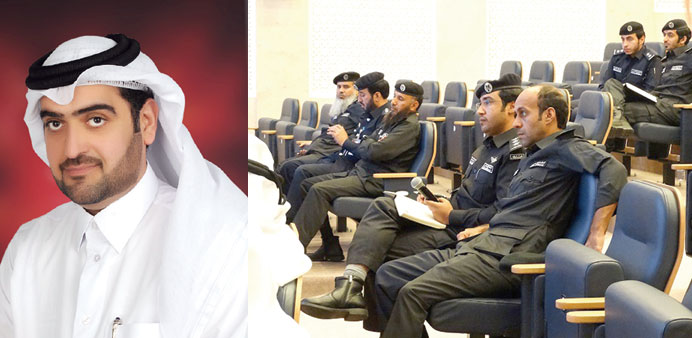Hassan Ahmed Marwani, technical interface senior manager at Qatar Rail. Right: Civil Defence personnel at the workshop.
Qatar Railways Company (Qatar Rail) organised a workshop at the Civil Defence headquarters demonstrating the safety procedures and evacuation plans for personnel working in the Doha Metro tunnels.
The workshop came as part of the ongoing collaboration between Qatar Rail and the Civil Defence to address occupational hazards and challenges during the Doha Metro works.
The event was attended by representatives of Civil Defence, besides with Hassan Ahmed Marwani, technical interface senior manager at Qatar Rail; Hamad Habib al-Qahtani, technical interface manager for the Doha Metro Red Line; Ali al-Shuraim, Civil Defence coordinator at Qatar Rail; as well contractors working on rail projects.
Qatar Rail has announced that it has received 21 state-of-the-art tunnel-boring machines for its Doha Metro project, with most of them currently operating in the tunnels. Before tunnelling began, pre-condition surveys were carried out by Qatar Rail on buildings along the route. Key monitoring points were installed and actions taken to ensure that all works are carried out under the safest
conditions.
This workshop was held for the Doha Metro Red Line South tunnels, which, in its first phase, extends from the Hamad International Airport to the Msheireb main station. This is the third assembly to be held by Qatar Rail in collaboration with the Civil Defence, with the participation of representatives from the Internal Security Force (ISF).
Hassan Ahmed Marwani said, “Qatar Rail makes sure to inform the Civil Defence on all the latest developments in its projects, in line with its vision to maintain close communication with all stakeholders in order to achieve the successful implementation of the rail network.”
He added, “The presence of local contractors and experts was very productive, as the workshop stressed on the importance of assistance services supporting emergency situations and immediate response, especially during the tunnelling phase. The focus is, of course, on the safety of the workers, who are playing a major role in completing the Doha Metro project and accomplishing the
Qatar Rail vision.”
He stressed that this session is part of a series of upcoming workshops that will address each project individually, discuss the safety procedures for the workers, and set emergency evacuation plans carried out by contractors onsite. “These workshops will be followed by Civil Defence field visits to Qatar Rail’s project sites, to make sure that work is advancing according to the highest
standards.”
With the launch of the tunnel works, Qatar Rail stresses on the safety measures that would be applied throughout the drilling phase. The planned procedures involve elements that can guarantee a safe working environment, far from the risks of injuries, including managing emergency cases and treating them swiftly.
For this aim, Qatar Rail is providing emergency and contact information panels equipped with emergency phones, first aid boxes and breathing apparatus every 250m and emergency lights every 50m in the tunnels.
Moreover, medical equipment and rescue teams are available to assist and respond during all shifts. The safety procedures also describe arrangements for segregation of plant and equipment from workers by including a separate walkway inside the tunnel for labor force. The tunnel-boring machine is also equipped with a rescue chamber that can accommodate 20 people and includes an air filtration system that operates up to 30 hours, a dynamic water shield fire protection system and four surveillance cameras.
Besides, the safety and security director of the Doha Red Line (southern section) made a presentation on the operational approach of the tunnel-boring machines, the number of employees working on this phase, the technique used in construction of tunnels, and the most important safety procedures applied for emergency evacuations in case of fire.

